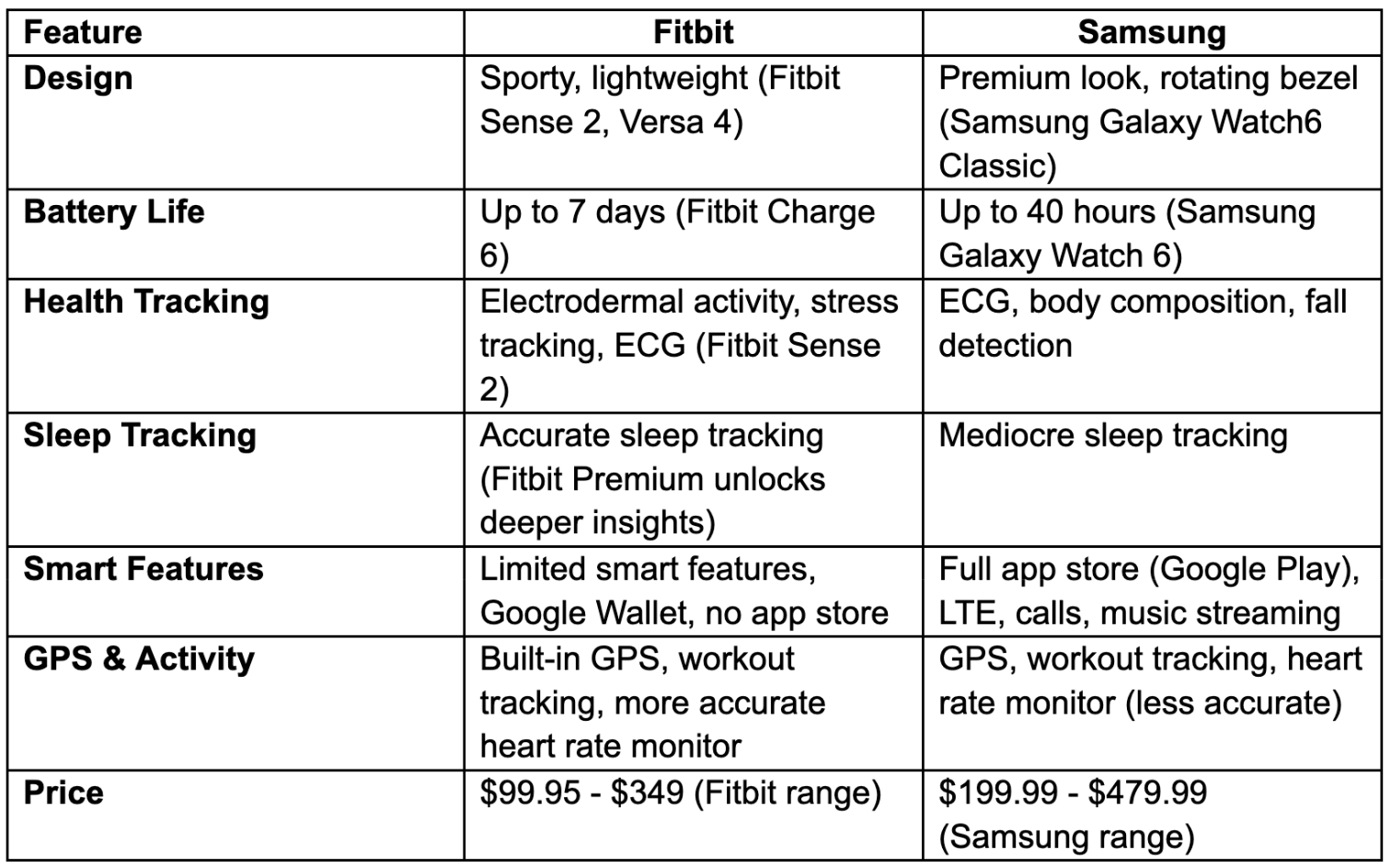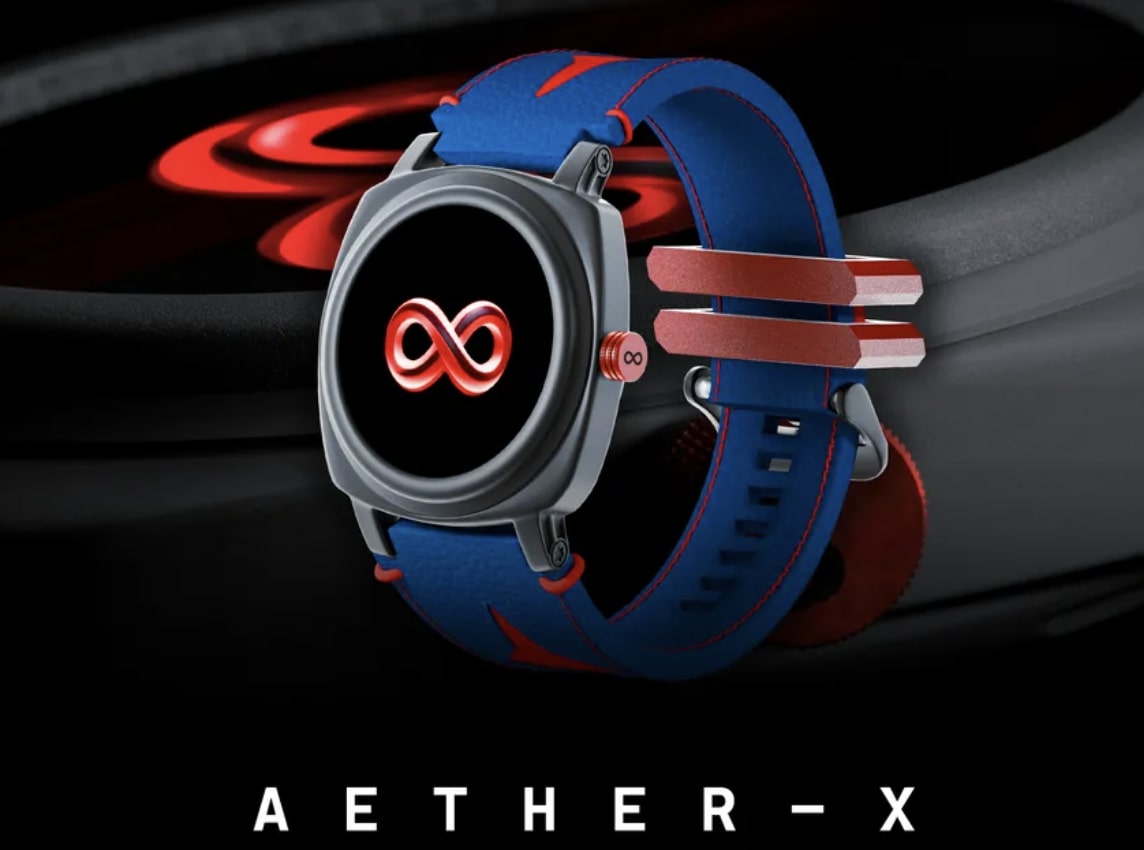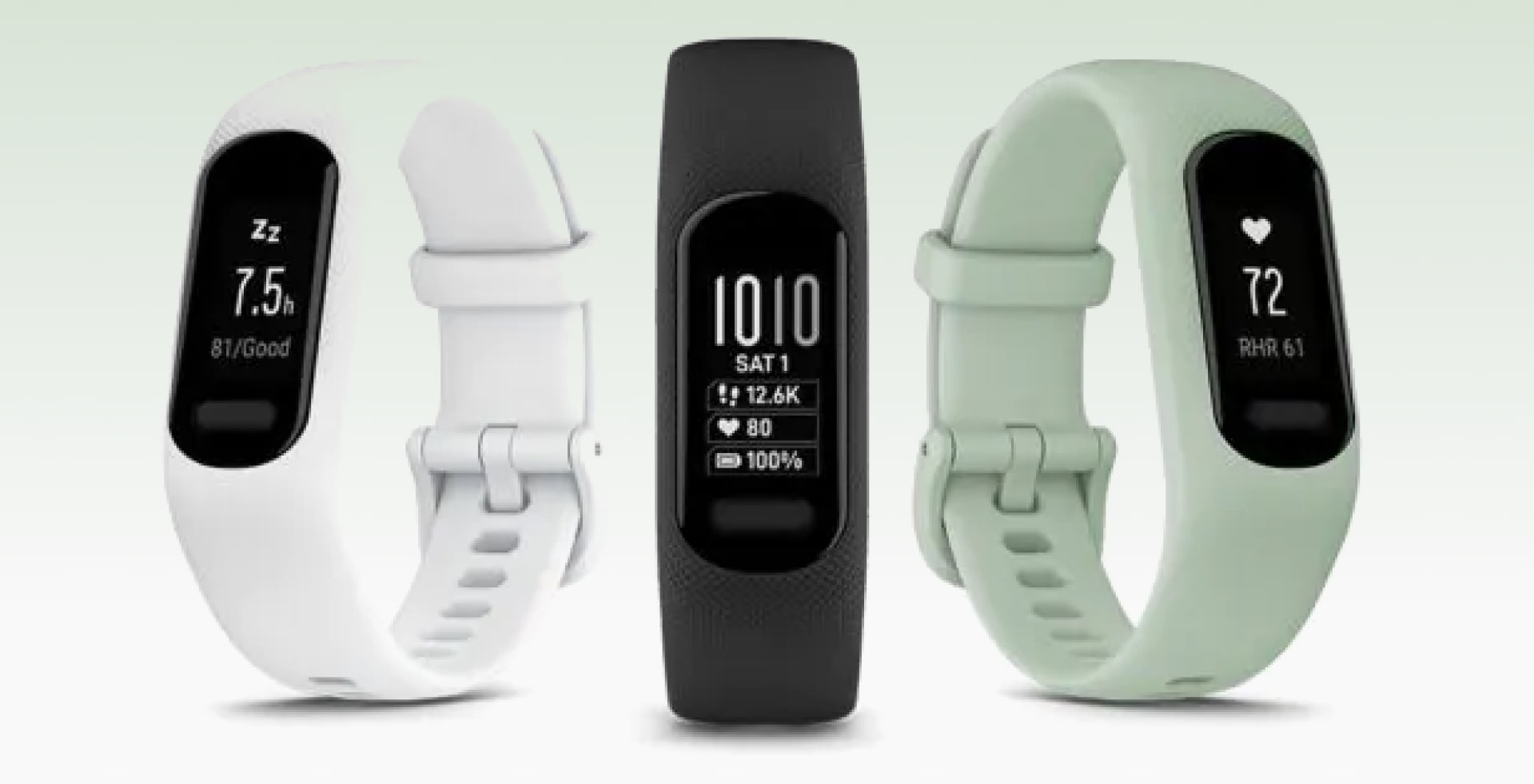Confused about whether the Fitbit or Samsung Watch is the right fit for you? Both offer powerful features, but with their unique strengths, picking the right one for you might feel like a bit of a puzzle.
In this article, I’ll walk you through the standout features and functions of both brands, focusing on where they excel and how they differ, to help you make an informed choice.
Stick around for my verdict in the next section, and be sure to check out alternative tracker options at the end of the article. Without further ado, let’s jump into the comparison!
Table of Contents
- Fitbit vs Samsung Watch: The Verdict
- Best Overall: Samsung Galaxy Watch 6
- Best Budget-Friendly: Fitbit Inspire 3 and Luxe
- Best for Outdoor Activities: Samsung Galaxy Watch 6
- Best Fitness Tracking: Fitbit Charge 6 and Sense 2
- Best Health Monitoring: Fitbit Sense 2
- Best Smartwatch Features: Samsung Galaxy Watch 6
- Best Battery Life: Fitbit Charge 6 and Sense 2
- Fitbit vs Samsung Watch: Detailed Comparison
- 2 alternatives to Fitbit and Samsung Watch
- Conclusion
Fitbit vs Samsung Watch: The Verdict
While both the Fitbit and Samsung watches bring unique advantages, the Samsung Galaxy Watch stands out as the overall winner. Samsung brings to the table a true smartwatch experience with its robust app ecosystem, access to Google Play, and advanced features like body composition tracking and cellular capabilities. These features make it more versatile for daily tasks, beyond just fitness tracking.
That said, Fitbit remains an excellent choice for those who prioritize health and fitness tracking. Fitbit's devices excel in areas like sleep monitoring, stress detection, and offer more detailed insights, particularly with the Fitbit Premium subscription.
If you’re after a detailed breakdown of features and performance, read on to the next section where we explore various categories in-depth.
Here’s a general overview of where each model excels:
Best Overall: Samsung Galaxy Watch 6
The Samsung Galaxy Watch 6 takes the crown for overall performance. The advanced integration with Google Play, strong fitness tracking features, and additional smart functionalities like fall detection and ECG make it a superior choice if you want more than just a fitness tracker.
Best Budget-Friendly: Fitbit Inspire 3 and Luxe
Fitbit offers better options if you’re on a tighter budget. The Fitbit Inspire 3 and Fitbit Luxe, for example, are affordable options that offer all the essential fitness tracking features without compromising on quality. They are ideal for users seeking a basic fitness band without the advanced smartwatch features of the Samsung Watches.
Best for Outdoor Activities: Samsung Galaxy Watch 6
For outdoor enthusiasts, the Samsung Galaxy Watch 6 is the better choice thanks to its GPS accuracy and rugged design, including water resistance and a rotating metal bezel for durability. It also features route tracking and elevation detection, making it perfect for hiking and adventure sports.
Best Fitness Tracking: Fitbit Charge 6 and Sense 2
When it comes to fitness tracking, Fitbit devices like the Charge 6 and Sense 2 lead the pack. These models offer precise activity tracking, sleep insights, and advanced metrics such as stress monitoring through electrodermal activity, making them ideal for health-conscious users.
Best Health Monitoring: Fitbit Sense 2
For health monitoring, both brands offer ECG and blood oxygen level tracking, but Fitbit Sense 2 edges out slightly with more comprehensive features like stress detection. However, Samsung’s body composition feature provides a different kind of health insight, making both strong contenders.
Best Smartwatch Features: Samsung Galaxy Watch 6
The Samsung Galaxy Watch 6 shines in the smartwatch category with its ability to install third-party apps via Google Play, make calls, and even access Google services like Maps. This makes it ideal for those who need a watch that can function independently from their smartphone.
Best Battery Life: Fitbit Charge 6 and Sense 2
If long battery life is a priority, Fitbit takes the lead. Devices like the Fitbit Charge 6 and Sense 2 can last up to 5 days on a single charge, while the Samsung Galaxy Watch typically lasts up to 2 days. This makes Fitbit more reliable for those who want to spend less time charging and more time tracking.
Fitbit vs Samsung Watch: Detailed Comparison
Disclaimer: This is not a product review! While I’ve compiled information from multiple reliable sources and YouTube videos, I haven’t personally tested these devices.

Both market-leading contenders offer feature-packed devices, but their focus differs significantly. Fitbit, known for its strong health and fitness tracking capabilities, is popular with users looking to stay active and healthy. Samsung, on the other hand, provides full-fledged smartwatches that not only monitor fitness but also deliver a range of smart features, integrating with smartphones more comprehensively.
Key Differences Between Fitbit and Samsung Watches
- Health and Fitness Tracking:
- Fitbit: Specializes in health metrics, offering advanced features like stress tracking via electrodermal activity, sleep insights, and ECG monitoring (on select models). Fitbit's health ecosystem is more robust, especially with a paid Fitbit Premium plan.
- Samsung: While Samsung offers health tracking (heart rate, ECG, blood oxygen), it also includes a body composition analysis feature that Fitbit lacks. However, some users have reported its accuracy to be inconsistent.
- Smart Features:
- Fitbit: Primarily focused on fitness. The devices have basic smart capabilities like notifications, Google Wallet, and Maps but lack app store access and cellular functionality.
- Samsung: Delivers a full smartwatch experience, supporting app downloads via Google Play, cellular connectivity, and features like music streaming and phone calls.
- Battery Life:
- Fitbit: Generally lasts longer, with most devices providing 4-5 days of battery life.
- Samsung: Provides around 2 days of battery life on smartwatches with full functionality.
- GPS and Workout Tracking:
- Fitbit: Built-in GPS on higher-end models for outdoor activity tracking; however, users have noted occasional accuracy issues.
- Samsung: Also offers GPS but with similar accuracy concerns during workouts.
- Design:
- Fitbit: Sportier and more minimalist in design, with most models featuring a square or rectangular face.
- Samsung: Offers a more premium look, especially with the Galaxy Watch 6 Classic that includes a rotating metal bezel.
Which One is for You?
Choosing between a Fitbit and a Samsung smartwatch depends on your priorities. If fitness tracking is your primary concern, Fitbit’s ecosystem offers more comprehensive health data and longer battery life, making it ideal for users who are focused on maintaining their health and fitness (Fitbit Versa vs Samsung…)(Fitbit vs Samsung Watch…). On the other hand, if you want a more versatile smartwatch experience with access to apps, phone calls, and other smart features, Samsung’s Galaxy Watch series is the superior option(Fitbit vs Samsung Watch…).
2 alternatives to Fitbit and Samsung Watch
Aether X Limited Edition Designer Smartwatch

If you’re all about luxury and innovation, the Aether X Limited Edition Designer Smartwatch is for you. Although it hasn't launched yet, it has generated significant anticipation and excitement among tech enthusiasts and consumers.
Featuring a metallic frame and authentic red patina leather strap, Aether X combines luxury and innovation. It offers comprehensive health tracking with 45 sports modes and advanced sensors for fitness tracking.
You can also track your sleep patterns and manage stress effectively with its advanced sensors. With only 10,000 pieces available, this exclusive smartwatch offers free shipping and up to 25% off.
Garmin

If neither Fitbit nor Apple Watch suits your lifestyle, you might want to consider getting Garmin to boost your fitness productivity. Garmin smartwatches stand out for their exceptional versatility. Garmin features an ergonomic design and modern technology to track your health, and fitness, and send alerts from your phone. You can also use it to pay for your purchases without taking out your wallet, and the battery lasts for several days. With its robust features and durability, it’s perfect for anyone seeking a comprehensive health and fitness companion.
Price range:
- Entry-level models like the Garmin Forerunner 45 can be found for around $200
- Mid-range models like the Garmin Vivoactive 4 and Forerunner 245 usually cost between $200-$350
- High-end models like the Garmin Fenix series and MARQ collection can exceed $600, with some models priced over $800.
Conclusion
To sum it up, Fitbit and Samsung Watches serve different purposes. Fitbit excels with its detailed fitness tracking, ideal if you're focused on health metrics and prefer a more affordable option.
Samsung Watches, meanwhile, offers a more comprehensive experience with features like app access and call capabilities. Think about what you need most and choose the device that fits your lifestyle best.



